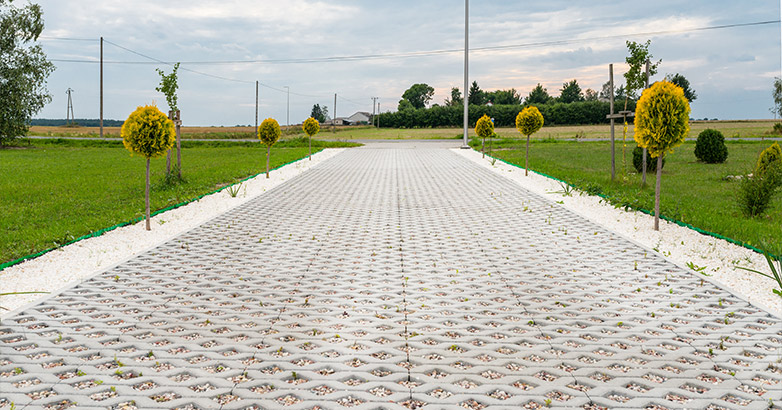Grass Driveways – Benefits, Options and Ideas
Grass driveways have been in existence for over a decade now. However, the technically constructed pavement of turf and solid concrete, paver, asphalt, or gravel, has gained quite a popularity among homeowners, and for a good reason. Some of our traditional ways of living are now being questioned, which is only logical given the rising concern about the climate and the influences humans have on it.
Grass driveways are a replacement for standard pavers, asphalt, and concrete. They are constructed from recycled plastic or concrete and have open blocks that allow grass to grow through them. Permeability is a significant environmental benefit of a green driveway because it allows rainwater runoff to filter pollutants and naturally rehydrate the soil and vegetation. These permeable systems also have a sub-base that retains water and lessens the consequences of flooding.
In 2017, when Hurricane Harvey hit Houston, the United States Geological Survey noted that a lot of hardscapes were responsible for increased flooding. Green pavers now come to our rescue. This article discusses the importance of green pavement and its effect on our environment; the different types and steps involved in building your grass driveway.
Are grass driveways good?
Adding a grass driveway to your house or landscaping could make it easier for you to access a green area, and being in a green area, as we already know, has a positive effect on our mental health, the development of our children, and the well-being of our environment as a whole.
Here are some of the reasons why grass driveways are gaining popularity in 2022:
Better stormwater drainage
Enhancing stormwater infiltration can benefit the soil health in the area, lessen rainfall runoff, and perhaps even lessen downstream flooding. It may also aid in recharging and preserving natural groundwater aquifers.
When your driveway is made of asphalt, concrete, or cement, the normal water drainage system into the earth is prevented by the solid surfaces’ lack of permeability. As a result, any water that comes into contact with these stable concrete surfaces will runoff and disperse into canals and stormwater ducts.
This stormwater runoff is a significant source of pollution for streams and other water bodies since it picks up chemicals and garbage along the way. Building a grass driveway allows the stormwater to be absorbed into the soil and filtered by bacteria and roots before it enters streams and aquifers. This organic process of absorption also aids in water conservation.
Trees may have the room required to reach their full potential with permeable driveways
Refreshing air and water can move down the rooting zone through the permeable surface. This aids planting and provides a living tree canopy overhead to enhance your view of the environment.
Grass driveways provide a cooler ambiance in stuffy cities
Since concrete tends to retain heat while grass has a cooling impact, urban areas are frequently many degrees warmer than the nearby countryside. It is possible to reduce cooling expenses and carbon emissions by replacing asphalt or concrete with grass.

Grass driveway systems
As previously mentioned, a grass driveway system has numerous advantages over conventional parking surfaces. A well-structured grass driveway system transforms your paved area into a stunning work of art. This is a collection of systems to pick from if you’re interested in converting your driveway and lawn into a mini paradise
Plastic grids
Plastic grid systems are installed and filled with gravel or sand/soil mixture and grass. These grid systems, mostly recycled plastic, prevent soil compaction and rutting, protecting water quality. They are composed of honeycomb-like grids of closed plastic cells.
Concrete and grass
Concrete and grass are popularly known as grass pavements. It is made up of a system of carefully moulded concrete slabs with ample space for the growth of turf. They allow easy drainage of stormwater to the soil.
Grass and paver
Grass block paving stones also go by the names turf block paving stones or grow-through paving stones. They contain open cells that allow grass to grow through them. They are an absorbent, environmentally beneficial choice for parking lots and roads.
Ribbon driveway
These are also known as Hollywood driveways. They typically have two parallel tracks divided by an unpaved section and paved with a hard substance built for the passage of vehicles.
How to build a grass driveway
The old-timer rule of not driving on grass has been thrown out for a more refreshing and esthetically pleasing viewpoint. The following steps will guide you through building your green driveway using geo-grids.
- Make sure it is safe to dig where you are. Call on the utility services to confirm this information.
- Depending on the anticipated load and drainage requirements, begin excavating in your defined area at the street-grade level. Then move down approximately six inches.
- Spend some time calculating the slope of your property and the amount of detention area you require beneath the grass paver system.
- Use a tamper to level the dirt and construct the sub-base.
- Ensure the grid completely encloses the space and lies at least an inch below ground level.
- Fill up the grid’s hollow space with loam soil and flatten it out with a rake when it has been entirely submerged and laid out. Watering down the grid system aids with soil compaction.
- Finally, pick a grass seed or turf of your choice and place it in the grids.
Grass driveway ideas
The modern-day green driveway systems have presented us with creative and practical ways to elevate the appearance of our homes. We are ready to take in all that is being offered.
Have a look at these beautifully designed driveways to get an idea of what you want yours to look like.
Colorful and Rich Grass Block Paver Walkway
Gorgeously Wavy Grass Paver Driveway
A Ribbon Driveway
Classy Concrete-style Driveway
Related Articles:
Conclusion
The effect of global warming is constantly on the rise, and the need to cut down our carbon emissions and plastic use are necessary. Embracing grass driveways means you’re contributing to saving Mother Earth while also looking out for your mental health and home’s beauty.


